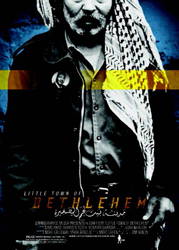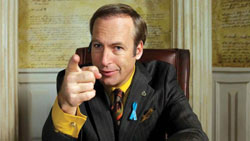“I didn’t write this script. I listened to it,” writer/director Jim Hanon said about his documentary, The Little Town of Bethlehem to a crowd of young and old on October 10 in Wilson Auditorium. Hanon was the latest filmmaker to present his work and participate in a Q & A in the new film series, On Screen In Person.
On Screen In Person began at the University September 12 when Nancy Kelly presented her documentary, Trust, at Pollak Theatre. This films series continues to be sponsored by the Department of Communication and the Performing Arts Series; it is also funded by the National Endowment for the Arts Regional Touring Program.
The Little Town of Bethlehem focused on three individuals living in Israel, Sami Award (Christian), Yonatan Shapira (Jewish), and Ahmad Al’Azzeh (Muslim).
Together, they talked about living in Israel or Palestine and discussed the difficulties they had and still face in this conflicted region. They then discussed how each has worked to promote peace in the Middle East through non-violent demonstrations and organizations.
Chad Dell, chair of the Department of Communication, welcomed the audience and said On Screen In Person is a touring film series along the East coast and four more filmmakers are scheduled to visit the University.
Since the Auditorium is smaller than Pollak Theatre, Dell encouraged the audience to move up and said, “This screen is merely respectable. The sound system is good. Take advantage of the special seats up front.” Dell also thanked colleague Andrew Demirjian, specialist professor from the Department of Communication, for bringing his classes to this event, Donna Dolphin, Communication professor for working with Dell on On Screen In Person, as well as Saliba Sarsar, professor of Political Science and Associate Vice President for Global Iniatives.
The Little Town of Bethlehem was a compelling documentary that observed the Middle East through the eyes of its people and their approach of nonviolence. By talking to Christians, Jews, and Muslims, the viewer was presented a well-rounded perspective of each individual’s life.
For example, Al’Azzeh talked about having to leave home with his family but returning to save his TV only to hide on the floor for 10 minutes, weeping, as bullets flew over his head. Overall, Hanon showed that everyone is affected when it comes to violence no matter what religion they are. In the end, it’s about coming together or standing divided.
Since nonviolence was the major theme, an interesting aspect was how the Civil Rights Movement mirrored the nonviolent movement in Israel with images of civil right protesters being dispersed and hit with fire hoses next to Palestinians protesting against Israeli soldiers. In the Q & A, Hanon said in interviews his subjects brought up Martin Luther King, Jr. and Ghandi to discuss nonviolence, showing the cultural influence of these famous men.
A hopeful part of The Little Town of Bethlehem was how all these influences children. Great people like Award, Shapira, and Al’Azzeh, show kids in Israel and throughout the Middle East that you don’t have to hate one another. There are ways to communicate and learn to work with people of various backgrounds despite what others say.
However, in some cases it is tough as with Al’Azzeh, who the film said was having trouble getting medicine for his child.
Additionally, Hanon’s film at times discussed the Holocaust and here, the viewer got a sense of the worst that man can do against one another. Award and Shapira both talked about visiting the camps and seeing the horrors that one can do against their fellow man. While Al’Azzeh hadn’t visited the camps, he did mention the 1972 Olympic hostage situation as an example of how few individuals can tarnish the reputation of others. These men understand that when people go to the extreme, any sense of peace and nonviolence can disappear.
What calmed the movie down was its music, which was presented in a unique way. Instead of just Middle Eastern music, The Little of Town Bethlehem used rap music to capture people’s frustrations as well as the soothing melody of “O Little Star of Bethlehem,” which was sung with the sense that maybe people can work together if they listen. Hanon even said during the Q & A that it was “a collection of blues, Middle East, rap” from musicians of different backgrounds.
The Little Town of Bethlehem discussed a tense subject but showed a strong attempt to bring peace to the Middle East no matter one’s background. Hanon showed working in harmony and using nonviolence is tough, but not impossible.
Following the film, Hannon thanked the audience for their time and described by the film saying, “[Award, Shapira, and Al’Azzeh] are continuing this journey, I’m continuing this journey, and now you are continuing this journey.”
Dell moderated the Q & A, which became an active and insightful discussion on the film and included questions from Hanon’s communication approach, the current state of this nonviolent movement, and why he chose this topic.
An older woman asked how Hanon was influenced by what his interviewees said. “The purpose of the film was not to show who was right or wrong,” Hanon said. “We wanted to say that there is another narrative here.” He also said “I’m on the side of both. I love and pray for Israel. I love and pray for Palestine. There isn’t a simple answer to this complex question.”
Demirjian asked Hanon about the cinematography in the film and his approach (Hanon was also the director of photography). Hanon said that he was “deliberate when it came to subtext. Meals aren’t an accident. Breaking bread symbolizes the sharing of life.” He also said to inspiring filmmakers, “Film photography and composition is something you should learn to master.”
A male student asked how Hanon worked with the opposition in the film. Hanon said that working in this film was challenging and it “affects your life and how you look at an issue.”
One man thanked Hanon and said, “This film broke down my barriers.” Then a Palestinian man in the front commented by saying, “Maybe the next challenge for [Hanon] is to talk about the women,” using two Israeli and Palestinian women.
After a last call for questions, Hanon thanked the crowd once more.
Junior Aaron Goldner and senior Felipe Robles attended On Screen In Person for the second time and both found the program to be intuitive.
Robles said this series has films that “challenge you to educate yourself” while Goldner said, “This program is excellent. It presents issues and topics no one is talking about to having the filmmaker telling you about scenes. Any questions you have can be answered.”
The next On Screen In Person screening for the fall is In Good Time: The Piano Jazz of Marian McPartland on November 7 in Pollak Theatre.
PHOTO COURTESY of littletownofbethlehem.org




